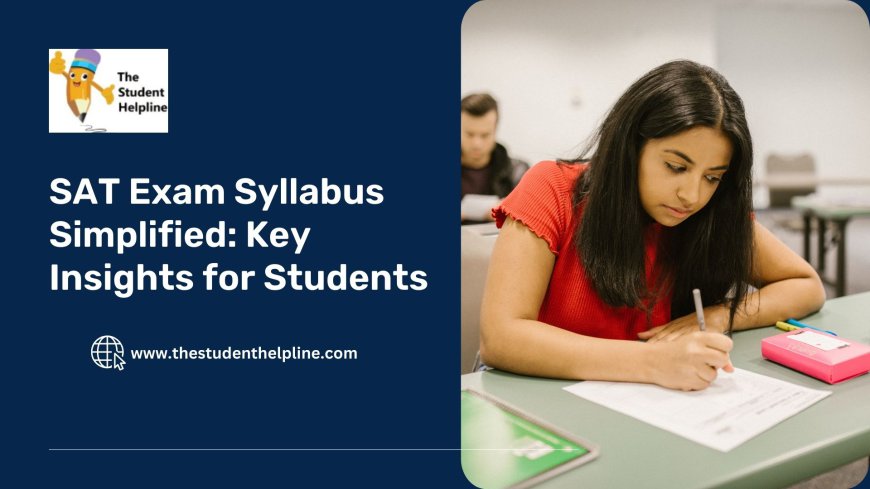SAT Exam Syllabus Simplified: Key Insights for Students

The SAT exam plays a critical role for students aspiring to pursue higher education, especially for those targeting international universities. This standardized test evaluates a student's readiness for college by assessing their skills in critical reading, mathematics, and writing. Indian students, in particular, can benefit from a clear understanding of the SAT exam syllabus to excel in their exam preparation.
Understanding the SAT Exam Syllabus
The SAT exam comprises two main sections: Evidence-Based Reading and Writing (EBRW) and Mathematics, along with an optional Essay section. Below, we break down the syllabus for each section to help Indian students and other aspirants streamline their study plans.
Evidence-Based Reading and Writing (EBRW)
This section tests your ability to comprehend and analyze written material, as well as your command of standard written English. It is divided into two parts:
-
Reading Test:
Focuses on comprehension and reasoning skills. Students need to read passages and answer questions based on their understanding. Key areas include:- Passage types: Literature, historical documents, social sciences, and natural sciences.
- Skills tested: Identifying central ideas, interpreting data, understanding the meaning of words in context, and evaluating arguments.
-
Writing and Language Test:
Assesses your ability to identify and correct errors in written text. Key areas include:- Grammar and usage: Subject-verb agreement, modifiers, sentence structure.
- Rhetorical skills: Improving clarity, style, and organization of passages.
Mathematics
The Math section evaluates your proficiency in mathematical concepts and problem-solving abilities. It is divided into two parts: one allowing the use of a calculator and the other not. Key areas covered include:
- Heart of Algebra: Linear equations, inequalities, and systems.
- Problem Solving and Data Analysis: Ratios, percentages, proportional relationships, and data interpretation.
- Passport to Advanced Math: Quadratic equations, polynomial manipulation, and functions.
- Additional Topics in Math: Geometry, trigonometry, and complex numbers.
Optional Essay
Although the essay section is optional, some colleges may require it. It involves analyzing a given passage and writing a coherent essay that evaluates the author's argument. Key skills tested include:
- Understanding and analyzing the text.
- Crafting a logical and structured response.
- Using evidence to support your analysis.
Why the SAT Exam Syllabus Matters for Indian Students
Indian students often excel in technical subjects but may find the reading and writing sections challenging. Understanding the SAT syllabus helps focus their efforts where it's needed most. Additionally, the exam format ensures that students are tested on practical, real-world skills, which can be beneficial for future studies abroad.
Tips for Tackling the SAT Syllabus
- Understand the Exam Pattern: Familiarize yourself with the types of questions and their formats.
- Practice with Official Resources: Use College Board's official SAT practice materials to ensure you are studying relevant content.
- Focus on Weak Areas: Identify sections where you need improvement and allocate extra time for those topics.
- Regular Mock Tests: Simulate exam conditions to build stamina and improve time management.
Preparing for the SAT Exam Syllabus as an Indian Student
Indian students often have access to robust educational resources, but preparing for the SAT requires a strategic approach. Balancing school academics with SAT syllabus preparation can be challenging, but with a well-organized study plan, success is achievable.
Conclusion
Understanding the SAT exam syllabus is the first step to effective preparation. By focusing on the specific requirements of each section, Indian students can optimize their study time and improve their chances of achieving a high score. Remember, consistent practice and targeted preparation are the keys to acing the SAT.

 dhiman12
dhiman12